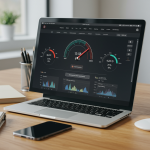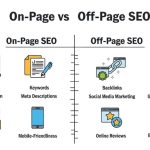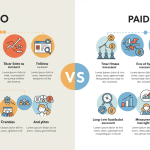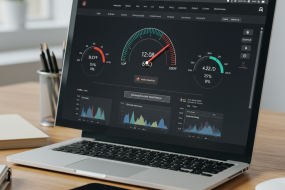
Complete Off-Page SEO focuses on building authority through quality backlinks, brand mentions, digital PR, and relationships, helping websites improve trust, rankings, and long-term organic visibility.
Most websites focus intensely on perfecting their on-page SEO while neglecting the other half of the ranking equation. Off-page SEO represents the external signals that search engines use to evaluate your website’s authority, trustworthiness, and relevance. While you can’t control these factors as directly as on-page elements, strategic off-page optimization can dramatically boost your search rankings and online visibility.
Off-page SEO encompasses everything that happens outside your website to influence your search engine rankings. From earning high-quality backlinks to building brand mentions across the web, these external signals tell search engines whether your content deserves to rank above competitors.
Understanding Off-Page SEO Fundamentals
Off-page SEO refers to all optimization activities that occur outside your website to improve your search engine rankings. Unlike on-page SEO, which focuses on optimizing elements within your site, off-page SEO involves building your website’s reputation and authority through external signals.
Search engines view off-page factors as votes of confidence from other websites and users. When reputable sites link to your content or mention your brand, search engines interpret these signals as indicators of your content’s quality and relevance.
The core principle behind off-page SEO centers on earning trust and authority from external sources. This trust translates into higher search rankings because search engines want to deliver the most credible and valuable results to users. To dive deeper into how title tags fit into the broader technical landscape, explore our Complete Guide to Technical SEO Services.
The Authority Connection
Website authority develops through consistent positive signals from external sources over time. These signals include backlinks from reputable sites, brand mentions, social media engagement, and user-generated content that references your brand.
Building authority requires a long-term approach focused on creating valuable content and fostering genuine relationships within your industry. Quick fixes and manipulative tactics typically backfire, as search engines have become sophisticated at detecting artificial authority-building attempts.
Link Building Strategies That Work

Link building remains the cornerstone of effective off-page SEO. High-quality backlinks from relevant, authoritative websites signal to search engines that your content provides value worth referencing.
Creating Linkable Assets
The foundation of successful link building lies in creating content that others naturally want to reference. Original research, comprehensive guides, industry surveys, and useful tools tend to attract organic backlinks because they provide unique value to readers.
Develop content that serves as the definitive resource on specific topics within your industry. When you become the go-to source for particular information, other websites will naturally link to your content when discussing related subjects.
Infographics, interactive tools, and data-driven reports perform exceptionally well for link building because they present information in easily digestible, shareable formats. These assets often get referenced across multiple websites and social media platforms.
Guest Posting Done Right
Guest posting remains an effective link building strategy when executed with quality and relevance in mind. Focus on contributing valuable content to reputable websites in your industry rather than pursuing any opportunity for a backlink.
Research target publications thoroughly before pitching guest post ideas. Understand their audience, content style, and editorial guidelines. Propose topics that align with their readers’ interests while showcasing your expertise.
Successful guest posting builds relationships with industry influencers and publications while positioning you as a thought leader. The backlinks you earn through guest posting should feel natural and provide genuine value to readers.
Broken Link Building
Broken link building involves finding broken links on relevant websites and suggesting your content as a replacement. This strategy helps website owners fix their broken links while earning you valuable backlinks.
Use tools to identify broken links on websites within your industry. When you find broken links pointing to content similar to yours, reach out to the website owner with a polite suggestion to replace the broken link with a link to your relevant content.
Success with broken link building requires patience and persistence. Website owners receive many such requests, so your outreach must be professional, helpful, and clearly demonstrate the value of your suggested replacement.
Digital PR and Brand Mentions
Digital PR extends beyond traditional link building to encompass broader brand awareness and reputation management efforts. These activities generate brand mentions, social media engagement, and indirect SEO benefits.
Building Media Relationships
Cultivate relationships with journalists, bloggers, and industry publications by consistently providing valuable insights and expert commentary. Position yourself as a reliable source for industry news and trends.
Respond promptly to media requests and provide thorough, quotable insights. When journalists know they can count on you for quality commentary, they’re more likely to feature your brand in future stories.
Create and distribute press releases for significant company news, product launches, or industry developments. Well-crafted press releases can generate media coverage and backlinks from news outlets and industry publications.
Leveraging HARO and Similar Platforms
Help a Reporter Out (HARO) and similar platforms connect businesses with journalists seeking expert sources. Regular participation in these platforms can generate high-quality backlinks and brand mentions from authoritative publications.
Monitor HARO emails daily and respond quickly to relevant queries. Provide detailed, helpful responses that demonstrate your expertise while addressing the journalist’s specific needs.
Success with HARO requires consistency and quality responses. Journalists appreciate sources who provide thorough, accurate information on deadline, leading to repeat opportunities and stronger media relationships.
Social Media and Off-Page SEO

Social media signals don’t directly impact search rankings, but social platforms significantly influence off-page SEO through content amplification, brand awareness, and link building opportunities.
Content Amplification Strategy
Use social media platforms to amplify your content and increase its reach. When your content gains traction on social media, it’s more likely to be discovered by potential linkers and industry influencers.
Share your content across relevant social platforms with engaging captions that encourage interaction. Use platform-specific features like hashtags, stories, and live videos to maximize visibility and engagement.
Engage authentically with your audience by responding to comments, participating in discussions, and sharing valuable insights beyond your own content. Building genuine relationships on social media can lead to natural link building opportunities.
Community Building and Engagement
Active participation in industry communities, forums, and social media groups can establish your expertise and generate organic mentions and links. Focus on providing value rather than promoting your content directly.
Join relevant Facebook groups, LinkedIn communities, and industry forums where your target audience congregates. Share insights, answer questions, and contribute meaningfully to discussions.
Build relationships with other community members and industry influencers. These relationships often lead to collaboration opportunities, guest posting invitations, and natural link building prospects.
Local SEO and Citation Building
Local SEO represents a crucial component of off-page optimization for businesses serving specific geographic areas. Citations from local directories and review platforms signal location relevance to search engines.
Optimizing Local Citations
Ensure your business information remains consistent across all local directory listings. Inconsistent NAP (Name, Address, Phone) information can confuse search engines and harm local search rankings.
Claim and optimize your Google My Business listing with complete, accurate information. Regular updates, customer reviews, and local content help improve local search visibility.
Submit your business to relevant local directories and industry-specific citation sources. Focus on quality directories that serve your target audience rather than pursuing every available listing opportunity.
Review Management Strategy
Customer reviews on platforms like Google, Yelp, and industry-specific review sites influence both local SEO and overall online reputation. Encourage satisfied customers to leave honest reviews while addressing negative feedback professionally.
Respond to all reviews, both positive and negative, in a timely and professional manner. Your responses demonstrate customer service quality and can influence potential customers’ decisions.
Implement systems to consistently generate new reviews from satisfied customers. Recent, positive reviews signal to search engines that your business remains active and customer-focused.
Measuring Off-Page SEO Success
Tracking off-page SEO performance requires monitoring various metrics that indicate growing authority and search visibility. These measurements help you understand which strategies generate the best results.
Essential Metrics to Monitor
Domain authority metrics provide insights into your website’s overall authority compared to competitors. While these third-party metrics don’t directly influence rankings, they offer useful benchmarks for tracking progress.
Monitor your backlink profile growth using tools like Ahrefs, SEMrush, or Moz. Track the number of referring domains, link quality, and anchor text diversity to ensure healthy link building progress.
Search engine rankings for target keywords indicate the effectiveness of your off-page SEO efforts. Track rankings regularly and correlate improvements with specific off-page activities.
Tools and Tracking Systems
Set up Google Alerts for your brand name and key executives to monitor online mentions. These alerts help you identify link building opportunities and manage your online reputation proactively.
Use social media monitoring tools to track brand mentions and engagement across platforms. This data helps you understand which content resonates with your audience and generates the most social signals.
Implement proper attribution tracking to understand which off-page activities drive the most valuable traffic and conversions. This information helps you focus resources on the most effective strategies.
Advanced Off-Page SEO Techniques

Advanced off-page SEO strategies require more sophisticated approaches but can generate significant competitive advantages when executed properly.
Influencer Collaboration
Partner with industry influencers and thought leaders to expand your reach and earn high-quality backlinks. Successful influencer collaborations provide mutual value while exposing your brand to new audiences.
Identify influencers whose audiences align with your target market. Focus on building genuine relationships rather than transactional partnerships that feel forced or inauthentic.
Collaborate on content creation, co-host webinars, or participate in industry events together. These partnerships often generate natural backlinks and brand mentions while building valuable industry relationships.
Content Syndication
Strategic content syndication can amplify your reach and generate additional backlinks when executed properly. Focus on high-quality syndication partners that add value rather than simply copying your content.
Negotiate syndication agreements that include proper attribution and linking back to your original content. This ensures you receive SEO benefits while expanding your content’s reach.
Monitor syndicated content to ensure proper attribution and prevent duplicate content issues. Use canonical tags when appropriate to maintain search engine clarity about content ownership.
Common Off-Page SEO Mistakes to Avoid
Even well-intentioned off-page SEO efforts can backfire when executed incorrectly. Search engines have become highly effective at identifying manipulative tactics, and mistakes in off-page SEO can lead to ranking drops or manual penalties. Understanding what not to do is just as important as implementing best practices.
Avoiding these common pitfalls helps protect your website’s authority while ensuring long-term, sustainable growth through Complete Off-Page SEO.
Key Off-Page SEO Mistakes
- Building backlinks from irrelevant or low-quality websites
- Over-optimizing anchor text with exact-match keywords
- Buying links or participating in private blog networks (PBNs)
- Ignoring brand mentions without links
- Focusing on quantity of links instead of relevance and authority
Off-Page SEO Mistakes vs Best Practices
| Mistake | Why It’s Risky | Best Practice Alternative |
|---|---|---|
| Buying backlinks | Can trigger penalties and loss of trust | Earn links through quality content and outreach |
| Exact-match anchor overuse | Looks unnatural to search engines | Use branded and contextual anchor text |
| Spammy directory submissions | Low SEO value and potential harm | Choose authoritative, niche-relevant directories |
| Ignoring link relevance | Weakens authority signals | Focus on industry and semantic relevance |
| One-time link building | Short-term gains only | Build links consistently over time |
Building Long-Term Off-Page SEO Success

Off-page SEO success requires patience, consistency, and a focus on building genuine relationships within your industry. The most effective strategies center on creating value for others while establishing your brand as a trusted authority.
Sustainable off-page SEO growth comes from consistently producing valuable content, engaging authentically with your community, and building relationships based on mutual benefit rather than purely transactional exchanges.
Focus on quality over quantity in all your off-page SEO efforts. A few high-quality backlinks from authoritative, relevant sources provide more value than numerous low-quality links that could potentially harm your rankings.
Remember that off-page SEO works best when combined with solid on-page optimization. The two elements complement each other to create a comprehensive SEO strategy that drives sustainable organic growth.
Start implementing these off-page SEO strategies gradually, focusing on the techniques that align best with your resources and industry. Monitor your progress regularly and adjust your approach based on the results you achieve.
How to Build a Scalable Off-Page SEO Strategy
A successful Complete Off-Page SEO approach is not about isolated tactics—it’s about creating a scalable system that consistently builds authority, trust, and visibility. A structured strategy allows you to grow your backlink profile, brand mentions, and reputation without relying on shortcuts.
Scalability comes from combining content creation, outreach, relationship building, and performance tracking into a repeatable process.
Steps to Build a Scalable Off-Page SEO Framework
- Identify linkable content opportunities through keyword research for SEO
- Prioritize high-impact link building tactics based on resources
- Build long-term relationships with publishers and influencers
- Track performance and refine outreach messaging
- Align off-page efforts with technical SEO services and on-page optimization
Scalable Off-Page SEO Framework Overview
| Strategy Component | Purpose | Outcome |
|---|---|---|
| Content assets | Attract natural backlinks | Higher authority and reach |
| Outreach system | Promote content consistently | Predictable link acquisition |
| Relationship building | Earn recurring mentions | Long-term brand trust |
| Performance tracking | Measure ROI | Strategy optimization |
| Technical foundation | Support authority flow | Maximum ranking impact |
Frequently Asked Questions (FAQs)
1. What is Complete Off-Page SEO?
Complete Off-Page SEO refers to all optimization activities performed outside your website to improve authority, trust, and search engine rankings. This includes link building, brand mentions, digital PR, social signals, and reputation management.
2. How is off-page SEO different from on-page SEO?
On-page SEO focuses on optimizing elements within your website, while off-page SEO focuses on external signals like backlinks and brand authority. Both are essential for a well-rounded SEO strategy.
3. Why is off-page SEO important for rankings?
Search engines use off-page SEO signals as trust indicators. High-quality backlinks and brand mentions signal credibility, helping your site rank higher than competitors with weaker authority.
4. Are backlinks still important in modern SEO?
Yes, backlinks remain one of the strongest ranking factors. However, quality matters more than quantity. Links from relevant, authoritative sites carry far more value in Complete Off-Page SEO.
5. How does technical SEO services support off-page SEO?
Technical SEO services ensure your site is crawlable, fast, and error-free so that the authority gained from off-page SEO is fully leveraged. Strong technical foundations amplify off-page efforts.
6. Can off-page SEO work without keyword research?
Keyword research for SEO plays an indirect role in off-page SEO by guiding content creation. When content aligns with high-intent keywords, it becomes more link-worthy and shareable.
7. Do brand mentions help SEO even without links?
Yes, unlinked brand mentions can still contribute to off-page SEO by reinforcing brand authority and trust signals, especially when they appear on authoritative platforms.
8. How long does it take to see results from off-page SEO?
Off-page SEO is a long-term strategy. Results typically appear within 3–6 months, depending on competition, link quality, and consistency of efforts.
9. What role does semantic SEO topic relevance play in off-page SEO?
Semantic SEO topic relevance ensures backlinks come from contextually related content. Links from semantically aligned pages carry stronger relevance and authority signals.
10. Is off-page SEO safe for long-term growth?
Yes, when done ethically. Sustainable Complete Off-Page SEO focuses on earning links, building relationships, and creating value—avoiding manipulative tactics that risk penalties.


















No Comments